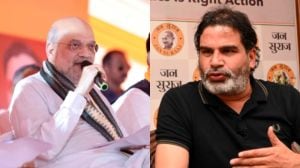Sinha washes hands of fall in growth
Nov 27: Finance Minister Yashwant Sinha on Monday said any slowdown in growth rate this year would be due to external factors and certainl...

Nov 27: Finance Minister Yashwant Sinha on Monday said any slowdown in growth rate this year would be due to external factors and certainly not because of any "policy failure" of the government.
"If there is any shortfall in the growth rate, it is entirely due to external factor. There is nothing wrong with Government’s policy framework," Sinha said on the sidelines of the Commonwealth Association of Tax Administrators Conference here.
Asked if he was confident of achieving over six per cent growth this year in the face of slowdown of the economy, Sinha told reporters that he would not hazard a guess and "let us see at the end of the year."
But he added "it is not a matter of life and death if the growth rate goes a few points positive or negative." Turning to fiscal deficit, Sinha said he was confident of keeping it at the targetted level of 5.1 per cent of GDP this fiscal.
The recent rollback of kerosene and cooking gas prices would not have any impact on the fiscal deficit of the budget. The rollback and burgeoning oil pool deficit might have an impact on the overall national deficit, but certainly not on the fiscal deficit of the budget as the oil pool account was outside it, Sinha said.
Sinha skirted the issue of introduction of agriculture income tax saying agriculture tax was a state subject and that it did not come under Centre’s purview.
What Andhra Pradesh Governor C Rangarajan had suggested was agriculture tax by states to augment revenue collections of states governments, he said.
According to Rangarajan, sales tax, which is the main source of revenue collections by states, has already been overstretched accounting for about 65 per cent of the state revenue, and agriculture tax offered opportunity for widening the tax base of states.
FM attacks tax havens: Finance Minister Yashwant Sinha on Monday opposed the use of tax havens to lure foreign investors, saying it harms the global tax system.
"If we were to offer them (investors) unbridled, unchecked, unrestrained tax concessions, then we are harming not only the tax structure within our own country but we are harming the tax system globally," Sinha told a taxation conference.
Sinha urged participants at the meeting of Commonwealth tax administrators to evolve a consensus against such practices, noting the OECD had identified some tax havens.
The Organisation for Economic Cooperation and Development (OECD) in June released a list of 35 states it judged guilty of "harmful tax practices" and threatened to slap sanctions on them if they did not clean up their acts within a year.
The OECD considers a tax haven to be a country which has nominal or no taxes and which either openly or implicitly sells itself as a country where foreigners can avoid awkward questions. The five-day meeting will tackle how to integrate and modernise tax systems as well as harmful tax competition.
Sinha added that money laundering had become easier with tax havens, saying that India had reserved its right to ask investors the origin of the money they put into the country. He said India wanted to ensure that foreign investments did not come from "tainted capital".
"These harmful tax practices, harmful level of competition ultimately leading to money laundering, is a slur which the international community is trying to counter," Sinha said.



- 01
- 02
- 03
- 04
- 05




























